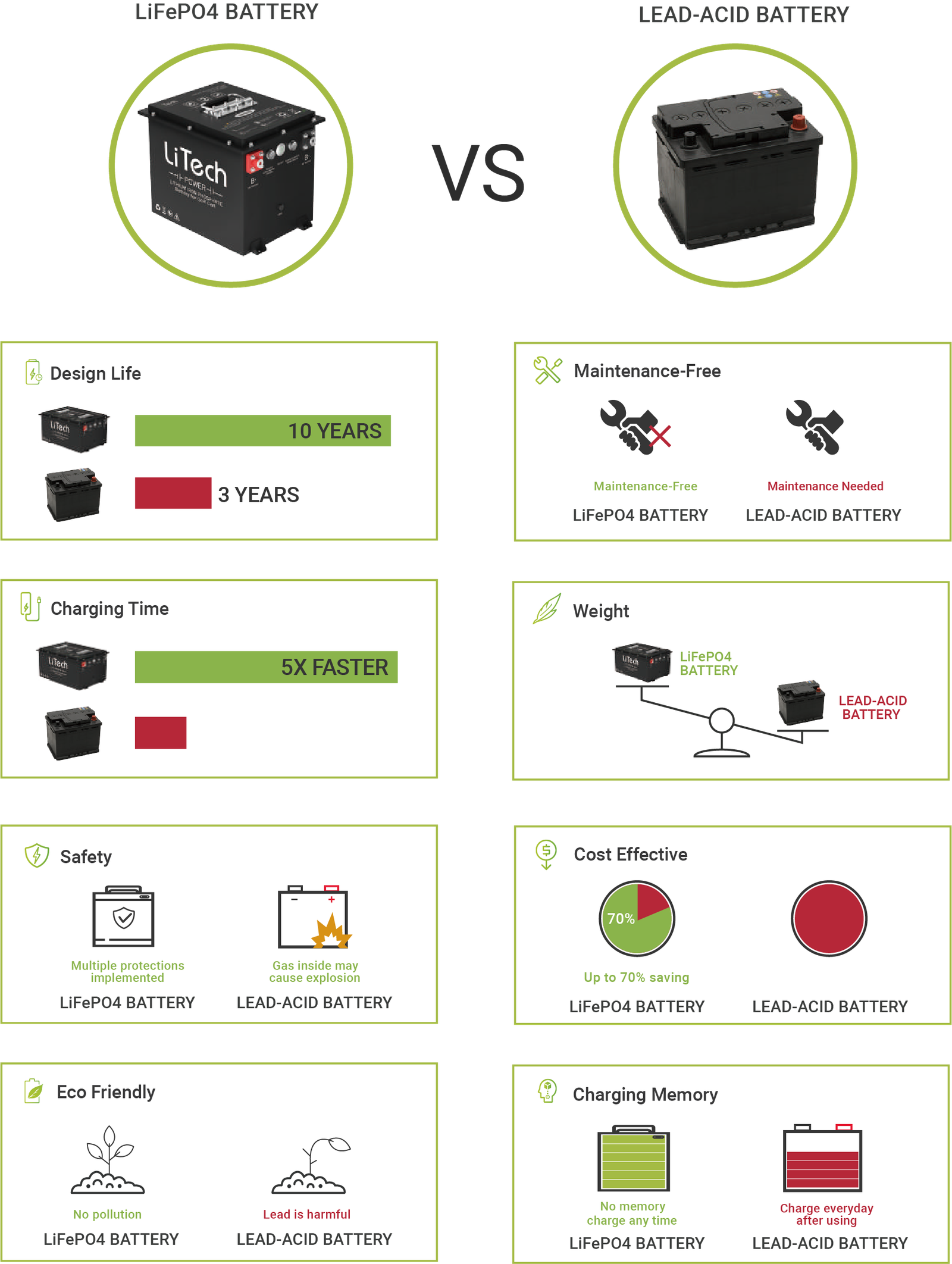How Many Batteries in a Golf Cart? golf-cart-battery-guide

People widely use golf carts for transportation on golf courses, in residential communities, and for various industrial applications. One of the most common questions people ask when purchasing or maintaining a golf cart is: How many batteries does a golf cart have? The answer depends on the type of golf cart and its voltage requirements.please review this golf cart battery guide.
Standard Battery Configurations
Most golf carts have either 36V, 48V, or 72V golf cart battery setups. The number of batteries depends on the voltage of each battery.
36V Golf Carts
Typically powered by six 6V batteries (6V × 6 = 36V).
Commonly found in older golf cart models, making them more affordable for those seeking a budget-friendly option.
Although 36V systems are cheaper, they might have less power and a shorter range compared to higher voltage setups. Ideal for those with lighter use and less demanding terrain.
48V Golf Carts
Powered by six 8V batteries (8V × 6 = 48V), or four 12V batteries (12V × 4 = 48V).
More powerful than 36V models, providing better performance, greater torque, and higher speed on various terrains.
Many modern golf carts use 48V systems. These systems improve energy efficiency. This allows for longer run times and less frequent charging. These setups are perfect for those seeking a balanced mix of power and range.
72V Golf Carts
You can configure it with 12 6volt batteries (6V × 12 = 72V) or nine 8V batteries (8V × 9 = 72V).
The most powerful option, offering exceptional torque, speed, and energy efficiency compared to both 36V and 48V models.
Popular in high-performance golf carts, especially for users who need strong power for steep hills, rough terrain, or long distances. The longer run times and enhanced performance make it ideal for intensive use.
lifepo4 golf cart battery guide
Lithium vs. Lead-Acid Battery Packs for Golf Carts
Design Life
Lithium-ion Batteries have longer battery life, with Higher cycle life, typically lasting 8 years or more.
Lead-Acid Batteries: Have a shorter lifespan, usually 3-5 years, requiring replacement more frequently.
Maintenance-Free
Lithium-Ion Batteries: Require little to no maintenance. No need for watering or terminal cleaning, making them hassle-free.
Lead-Acid Batteries: Need regular maintenance, including watering and cleaning terminals to prevent corrosion and maintain performance.
Charging Time
Lithium-Ion Batteries: Charge much faster, longer charging cycles, and often take only 2-4 hours to fully charge.
Lead-acid batteries take longer to charge, typically between 6 to 8 hours, and require more frequent charging.
Weight
Lithium-Ion Batteries: Much lighter, offering better efficiency and less strain on the golf cart. lighter weight helps enhance performance and makes the cart easier to handle.
Lead-acid batteries are heavier. This can lower the golf cart’s efficiency and make it harder to handle.
Safety
Lithium-Ion Batteries: Generally safer, with built-in management systems to prevent overcharging, overheating, and other risks.
Lead-Acid Batteries: Can be more prone to leakage and require careful handling, especially regarding maintenance and disposal.
Cost Effectiveness
Lithium-Ion Batteries: They have a higher initial cost, but they last longer. They need less maintenance and charge faster, making them cheaper over time.
Lead-acid batteries are cheaper to buy at first. However, they may require more frequent replacement. This can lead to higher maintenance costs. Because of this, they may not be cost-effective in the long run.
Charging Memory
Lithium-Ion Batteries: Do not suffer from charging memory issues. You can charge them at any time without impacting their overall lifespan or performance.
Lead-acid batteries can have a memory effect. This effect can lower the battery capacity. It occurs if they do not fully discharge before recharging.
Lithium battery VS lead acid battery
Choosing the Right Battery for Your Golf Cart
When selecting a battery setup, consider:
Usage Needs: If you use your golf cart frequently, a higher voltage system with lithium batteries may be a better choice.
Budget: Lead-acid batteries are cheaper initially, but lithium batteries save money in the long run.
Maintenance: Lithium batteries require little to no maintenance, while lead-acid batteries need regular upkeep.
Conclusion
The number of batteries in a golf cart depends on its voltage system and the type of batteries used. Standard golf carts typically have four to six batteries, while lithium-powered carts may require fewer. If you are considering an upgrade or replacement, choose the right battery type. This choice can improve your golf cart performance, efficiency, and lifespan.
If you need custom golf cart batteries, LiTech provides high-quality lithium battery solutions tailored to your needs. Contact us today for expert advice!







